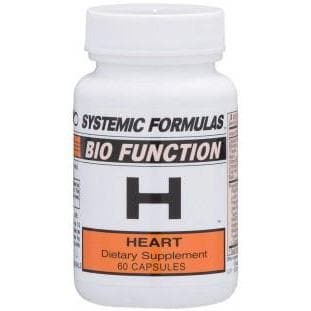
February Is Heart Health Month! Let’s Give Our Hearts Some Love
Share
Hearts are one of the most popular images for Valentine’s Day. The heart is a symbol of love and the most important muscle in the body. This special Valentine’s Day article will focus on the surprising causes of poor heart health and the top ways to overcome them. Here are some of the most surprising causes of poor heart health:
Sedentary lifestyle.
The human body was not designed to sit in a cubicle all day or spend hours watching television and playing video games. It was made to move. Sedentary behavior, which is defined as low energy expenditure while sitting or lying down, has been identified as an independent risk factor for cardiovascular disease.[1]
To decrease the risk of a sedentary lifestyle, getting up and walking periodically throughout the day has been shown to help decrease those risks. Here are a few simple yet effective ways to decrease the effects of a sedentary lifestyle:
- Walk for five to ten minutes every two hours.
- During television commercials, get up and walk around or march in place.
- Do a few sets of heel raises where you stand on your toes.
- Walk around or stand up when talking on the phone.
- Walk for 5 to 15 minutes after every meal.
Not enough sleep.
The body recovers and rejuvenates itself while sleeping. A lack of sleep or insufficient sleep over time can decrease the amount of healing and recovery time the heart needs. When healthy sleepers are compared to poor sleepers, Studies indicate the poor sleepers had a gradual loss of a cardiovascular disease-free life. This was especially true among those with sleep-related breathing disorders.[2]
Here are a few ways to get a good night’s sleep:
- Avoid caffeine in the evening. Caffeine is a stimulant that can keep you awake and alert.
- Keep your bedroom temperature cool. Higher temperatures can decrease sleep quality.
- Increase daytime light exposure. This can help regulate the body’s circadian rhythm.
- Limit the use of smartphones and computers before bedtime. This “blue light” can trick your brain into thinking it’s still daytime, keeping melatonin levels suppressed.
- Go to bed and wake up at the same time every day. This will help put the body on a sleep schedule.
Too much stress.
Studies indicate various external stressors could increase the risk of a cardiovascular event. This includes marital stress, work stress, trauma, childhood abuse or social isolation. To better help their patients, researchers advise physicians to explore these potential factors when assessing those in their care for cardiovascular diseases. This could help tailor treatment plans to each individual needs.[3]
Here are a few stress-relieving tips to try:
- Quiet meditation with deep breathing
- Yoga
- Squeeze a stress ball
- Go outside and get some sun
- Take a brisk walk outside
- Laugh: Watch a funny movie or laugh with friends
Poor dental hygiene.
Oral health can play a pivotal role in cardiovascular health. Tooth loss, periodontal disease, dry mouth, and other dental problems can accumulate throughout life. If left untreated, are believed to play a role in decreased quality of life and an increased risk of cardiovascular disease as people age.[4]
Here are a few key tips for maintaining good oral health:
- Drink more water. Drinking water throughout the day helps wash away food particles and acidic items on the teeth.
- Eat crunchy fruits and veggies. Eating apples, carrots, and other crunchy fruits and veggies may help to remove plaque from teeth.
- Brush teeth daily, especially at night. Brushing before bed helps to remove food particles, germs, and any plaque buildup that may have accumulated throughout the day.
- Brush your tongue. Gently brush your tongue daily to help decrease odors and plaque.
- Floss daily. Floss daily to remove food particles between the teeth.
- Use baking soda. According to the Journal of the American Dental Association, brushing teeth with baking soda can help neutralize plaque acids and oral bacteria and assist with teeth whitening and stain removal.
High sodium diet.
While sodium is needed for the body to function properly, too much sodium can be hazardous to a person's health, especially heart health. According to the CDC, only 2,300 mg of sodium is recommended for optimal health, but the average American consumes more than 3,400 mg daily. Excess sodium consumption may be linked to an increased cardiovascular risk factor, but studies indicate a reduction of salt consumption could be a potential strategy to reduce cardiovascular disease.[5]
In 2017, three million deaths were attributed to high salt intake.[5] Here are a few hidden sources of excess sodium:
- Lunch meats, cured meat, deli meat
- Breads and rolls
- Soups
- Fried foods
- Snacks (popcorn, pretzels, crackers, chips)
- Chicken
- Cheese
- Pizza
- Processed foods
- Tacos and burritos
In addition to limiting the consumption of the foods above, the following steps can be taken to lower sodium intake:
- Buy fresh or frozen vegetables
- Choose canned vegetables listed as “no salt.”
- When cooking, use garlic, spices, onion powder, and salt-free seasonings instead of table salt
- Limit the consumption of instant sauces, ready-made pasta, and flavored rice
- Bake foods instead of deep frying
Supplements
A variety of all-natural supplements are available to support heart health.
Fire Tonify
Also known as “support the heart,“Fire Tonify is a unique all-natural formula that strengthens and supports the heart and blood circulation. In ancient Chinese medicine, it is believed to nourish the heart, quiet the spirit, and warm and free the heart.
Fire Tonify contains many powerful herbs, including the following: 
- Rehmannia (Root)
- Astragalus (Root)
- Yellow Dock (Herb
- Lotus (seed)
- Polygonum (Root)
H – Heart
H - Heart supports the heart by providing the following benefits:
- Supplies substances for healthy heart functions
- Helps maintain and rebuild the heart
- Rebuilds and normalizes essential heart functions
H - Heart contains many key vitamins and nutrients essential for good heart health: 
- Calcium
- Riboflavin
- Thiamin
- Vitamin B6
- Folic acid
- L-carnitine
PTM 
PTM is a potassium stabilizer that helps to normalize magnesium, potassium, and sodium levels. In addition to supporting the heart muscles, it promotes healthy levels of magnesium and potassium in the blood. Low potassium levels have been linked to an increased risk of poor heart health, and increasing potassium intake can decrease the risk of cardiovascular disease.[6]
Summary
A healthy heart is a happy heart. As you share this Valentine’s Day with loved ones, make sure to stay mindful of habits that increase the risk of poor heart health.
References:
- Abbie C Bell 1, Joanna Richards 1, Julia K Zakrzewski-Fruer, (et al). Sedentary Behaviour-A Target for the Prevention and Management of Cardiovascular Disease. Int J Environ Res Public Health. 2022 Dec 28;20(1):532. doi: 10.3390/ijerph20010532. [PMID: 36612852].https://pubmed.ncbi.nlm.nih.gov/36612852/
- Bo-Huei Huang 1, Borja Del Pozo Cruz 2, Armando Teixeira-Pinto, (et al). Influence of poor sleep on cardiovascular disease-free life expectancy: a multi-resource-based population cohort study. BMC Med. 2023 Mar 2;21(1):75. doi: 10.1186/s12916-023-02732-x. [PMID: 36859313].https://pubmed.ncbi.nlm.nih.gov/36859313/
- Satyjeet F, Naz S, Kumar V(et al). Psychological Stress as a Risk Factor for Cardiovascular Disease: A Case-Control Study. Cureus. 2020 Oct 1;12(10):e10757. doi: 10.7759/cureus.10757. [PMID: 33150108]. PMCID: PMC7603890. https://www.ncbi.nlm.nih.gov/pmc/articles/PMC7603890/
- Eftychia Kotronia, Heather Brown, A. Olia Papacosta, (et al). Oral health and all-cause, cardiovascular disease, and respiratory mortality in older people in the UK and USA. Sci Rep. 2021; 11: 16452. Published online 2021 Aug 12. doi: 10.1038/s41598-021-95865-z. [PMID: 34385519].https://www.ncbi.nlm.nih.gov/pmc/articles/PMC8361186/
- David A. Jaques, Gregoire Wuerzner, and Belen Ponte. Sodium Intake as a Cardiovascular Risk Factor: A Narrative Review. Nutrients. 2021 Sep; 13(9): 3177. Published online 2021 Sep 12. doi: 10.3390/nu13093177. [PMID: 34579054]. https://www.ncbi.nlm.nih.gov/pmc/articles/PMC8470268/
- Yong Sun 1, Chang Hyun Byon 1, Youfeng Yang, (et al). Dietary potassium regulates vascular calcification and arterial stiffness. JCI Insight. 2017 Oct 5;2(19):e94920. doi: 10.1172/jci.insight.94920. [PMID: 28978809]. https://pubmed.ncbi.nlm.nih.gov/28978809/
